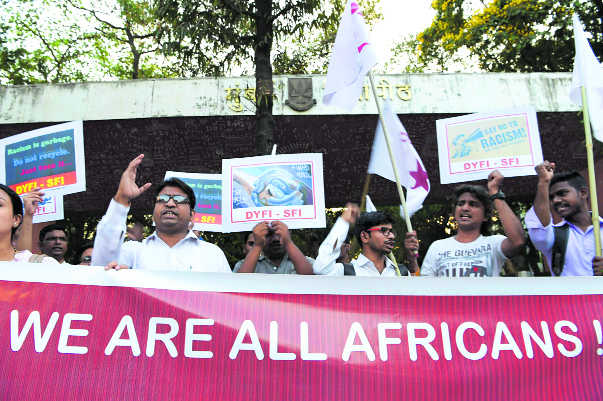Don’t Judge anyone by the Colour of the Skin, but by the content of Character
—Martin Luther King Jr
In 2013, African-Americans across the United States were deeply incensed by the cold-blooded murder of the 17-year-old school boy Trayvon Martin, but what got their goat what the perceived miscarriage of justice since the perpetrator of the heinous crime was acquitted. Africans living in India invariably place themselves in a similar predicament every time one of their own, faces a brutal assault.
Recent attacks on Africans in Delhi should make every Indian hang his or her head in shame. Gandhi's philosophy placing ahimsa paramodharma as the fountainhead of human behaviour for ensuring peaceful coexistence has evaporated in thin air. Half a century back, Martin Luther King Jr spoke of his vision for an America where his four children would not be judged by the colour of their skin but by the content of their character.
A teenage boy went missing in Greater Noida and it was alleged that some Nigerians practising cannibalism had a hand in the boy's disappearance and subsequent killing. There was also a brutal assault on an African woman residing in Bengaluru earlier. Notwithstanding the credibility of the as-yet-unconfirmed allegations that Africans peddle drugs and many are believed to be indulging in cannibalism, nothing whatsoever, justifies any attack on them. The law of the land should be the ultimate arbiter.
Some of my closest friends in college were from Africa. Seeing the reprehensible attitude of some disgustingly unruly people in India, my heart gets choked with emotions and my eyes become moist with immense lament, anger and anguish.
This writer has, shoulder to shoulder with fellow students from Africa, taken part in demonstrations against the racist regime of the Ian Smith-led Rhodesia — prior to its independence in 1965.
Reminiscing about my interactions and thought-provoking conversations with my African friends, which covered a wide canvas — ranging from apartheid, neocolonialism, Nehru, Nasser, the independence of many countries in their continent after long periods of subjugation and the hopes and aspirations of people there. I saw not merely a broad convergence of views but sniffed hopes of a joint India-Africa endeavour towards ridding the world from the scourge of poverty and disease.
The large-scale killings of innocent people at the hands of the Boko Harem bruised my body and soul no less than any Nigerian. Every pre-emptive attack by authorities made me ecstatic.
A few months back, my daughter was in Lagos ( Nigeria ). She was the lead female actor in the movie Love is in the Hair, produced by Emem Isong which had screenings in most African nations. Some part of this film was also shot on city streets. During one such shooting, a myriad group of locals got menacingly close to my daughter. The film crew, all Nigerians — seeking help from friendly locals — formed a protective ring around my daughter, since they didn't want any harm come to her. Why can't Indians display the same kindness and prevent untoward happenings to Africans?
India has enormous commercial interests in almost all African countries, every despicable act against Africans goes against the interest of African and Indian businessmen, who have, through the decades, left no stone unturned to further their cause. The damage done to cordial India-Africa ties by racial profiling and attacks on Africans can never be salvaged even by the best-attempted diplomatic outreaches, or, hosting of events such as the India-Africa Forum Summit in 2015. Only a zero tolerance to hate crimes against Africans can, hopefully, work. The law-enforcement agencies in India and the Ministry of External Affairs must fast-track the efforts to bring the guilty to book and adopt foolproof measures to eliminate the problem from the root.
Unlock Exclusive Insights with The Tribune Premium
Take your experience further with Premium access.
Thought-provoking Opinions, Expert Analysis, In-depth Insights and other Member Only Benefits
Already a Member? Sign In Now










